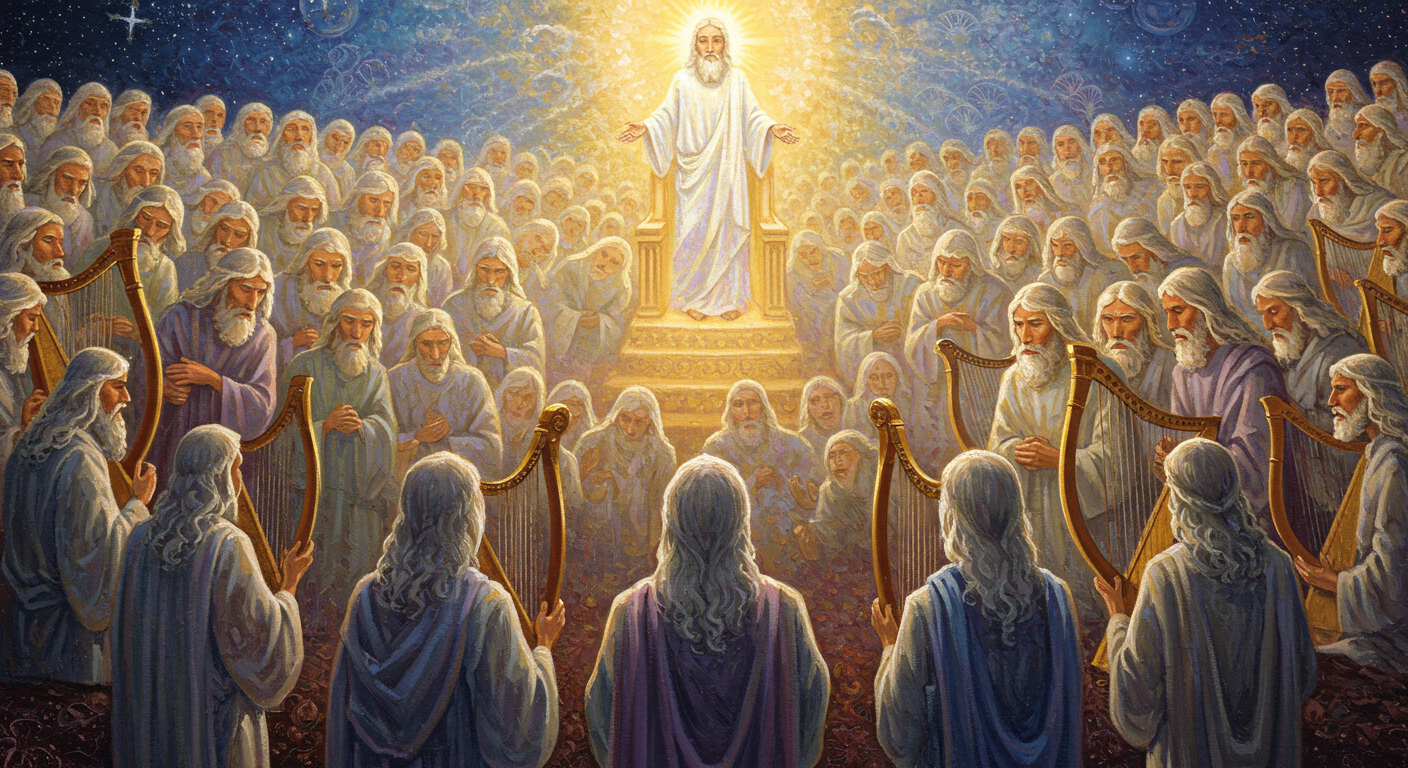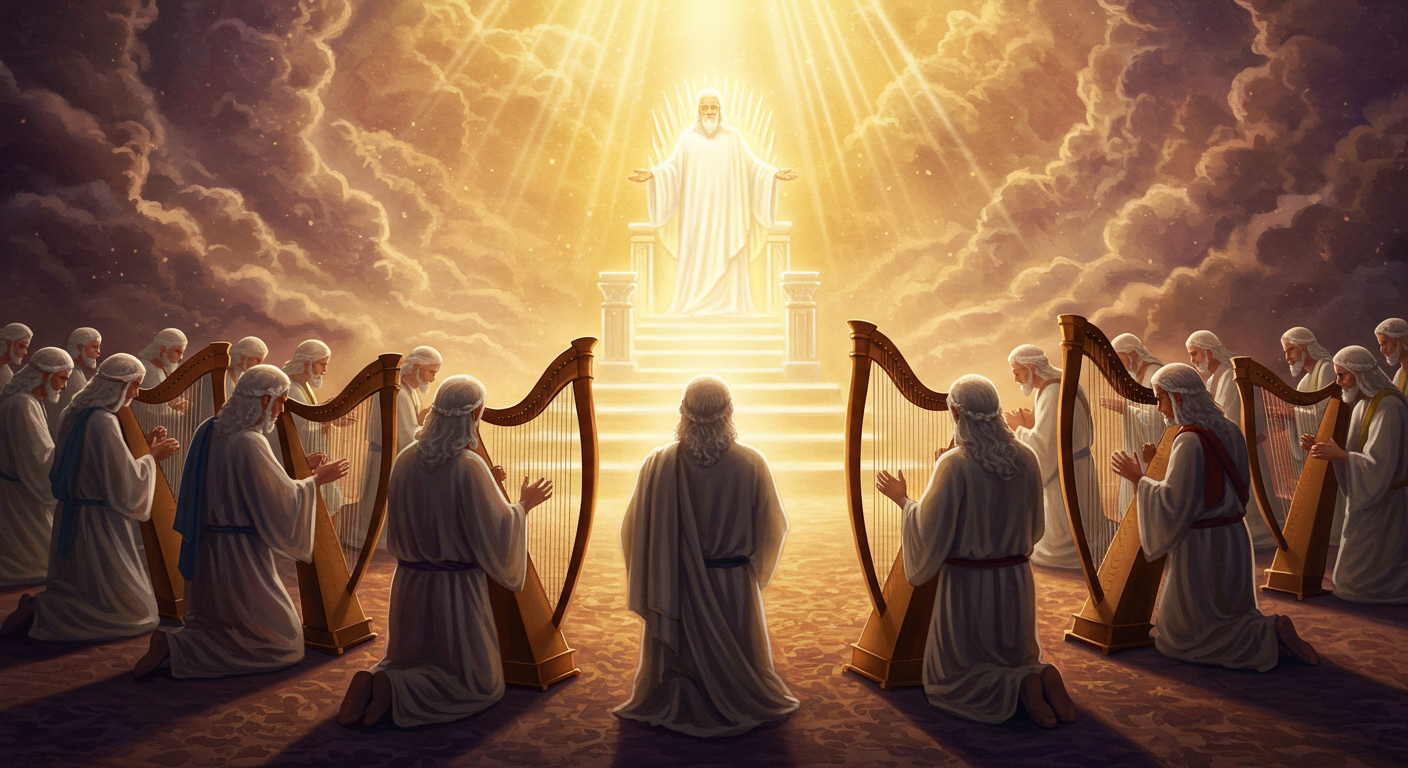Explore the celestial awe of The Elders’ Prayer from Revelation 4:8–11. Dive into its rich symbolism and timeless lessons on reverence and worship.

The Elders’ Prayer In Heaven – Revelation 4:8–11
Introduction
Imagine standing before a majestic throne engulfed in an ethereal aura; your heart pounding as celestial beings chant continuously in heavenly cadence. This is the awe-inspiring scene unveiled in Heaven’s divine court as captured in the Book of Revelation. Here, we dive into a prayerful moment resonating within the halls of Heaven, known as “The Elders’ Prayer.” This isn’t just a prayer; it’s a celestial symphony of adoration, a timeless chorus drawing every listener into the reverence echoing between Heaven’s jewels. In the following paragraphs, we’ll explore the profound significance of this prayer and the unrivaled beauty it holds. We’ll dissect its vivid imagery, uncover the layers of theological depth, and glean transformative lessons applicable to our prayer lives today.
Background of the Prayer
Revelation, written by John, exiled on the barren island of Patmos, opens a window to the extraordinary visions of heavenly worship. The passage, Revelation 4:8–11, is a captured moment of celestial adoration. The elders join the living creatures in their perpetual hymn of praise, “Holy, holy, holy is the Lord God Almighty, who was, and is, and is to come.” This isn’t a spontaneous cacophony but rather an orchestrated act of worship signaling God’s unchangeable holiness and eternal majesty. The 24 elders kneel, casting down their crowns, symbolizing their submission and acknowledgment of God’s supreme authority and glory. This powerful imagery reveals that even in Heaven, at the peak of all purity and perfection, the primary calling of the faithful is worship.
Key Elements of the Prayer
The prayer in Revelation 4:8–11 is steeped in rich symbolism and profound theological truths. Let’s delve into its core elements:
Holy, Holy, Holy
The thrice-repeated “holy” signifies God’s utter perfection and transcendence. In the Hebrew language, repetition underscores emphasis, and here, it highlights His distinct nature as entirely separate from all creation.
Lord God Almighty
This title asserts God’s omnipotence and supreme sovereignty. In calling God Almighty, the elders affirm their recognition of His unmatched power over all the cosmos—past, present, and future.
Who Was, and Is, and Is to Come
This series of titles encapsulates God’s eternal nature. He is the great “I AM,” always present and not bound by time. This eternal perspective shifts our prayers, encouraging us to focus on the eternal God who sees beyond our temporal challenges.
Casting Crowns
The elders’ gesture of casting their crowns before the throne is an act of surrender and honoring God with their victories, statuses, and achievements. By doing so, they acknowledge that all glory, honor, and praise rightfully belong to God.
Worthiness
In declaring God worthy, they recognize who He is—the creator and sustainer of all. Their praise is a declaration that everything exists according to His will and for His pleasure.
Lessons We Can Learn
The Elders’ Prayer is not a relic of ancient worship but a living testimony with enduring applications for today’s believers. Here are some principles it teaches us:
- The posture of Worship: The sincere worship seen in the posture of the elders—bowing and casting crowns—urges us to approach God with humility and total surrender, acknowledging His greatness above all.
- Focus on God’s Holiness: This prayer invites us to start our prayers by acknowledging God’s holiness and majesty. It’s a call to refocus our perspectives, aligning our will with the Holy One’s.
- Eternal Mindset: Embracing the idea that God is beyond time encourages us to trust in His perfect timing, resting assured in His unending presence through all circumstances.
- Acknowledgment of Dependence: Casting crowns reminds us that all victories and accomplishments in our lives are from God’s hand. There’s beauty in recognizing that everything we have is a gift and designed for God’s glory.
- Unceasing Worship: Just as the creatures and elders worship persistently, we are reminded of our call to live a life of continual praise, irrespective of our circumstances. It’s a call that transcends moments of worship to touch every part of our lives.
Similar Prayers in the Bible
The Bible is abundant with prayers resonating with similar themes witnessed in the Elders’ prayer.
Isaiah’s Vision and Praise
Consider Isaiah’s vision in Isaiah 6:3, where he too encounters celestial beings declaring God’s holiness, “Holy, holy, holy is the Lord Almighty; the whole earth is full of his glory.” Isaiah’s experience echoes the acknowledgment of God’s unapproachable holiness.
Solomon’s Prayer of Dedication
In 1 Kings 8:23, Solomon prays during the temple dedication, recognizing God’s unmatched power and faithfulness: “Lord, the God of Israel, there is no God like you in heaven above or on earth below.” His prayer complements the elders’ reverence, focusing on God’s uniqueness and sovereign promise.
David’s Song of Praise
In 1 Chronicles 29:11, David beautifully acknowledges God’s sovereignty: “Yours, Lord, is the greatness and the power and the glory and the majesty and the splendor, for everything in heaven and earth is yours.” David’s heart of worship aligns with the eternal praise from Heaven’s chorus.
How to Apply This Prayer Today
Enacting the principles of the Elders’ Prayer into our daily routines requires intentionality and faith. Here are practical steps for incorporating the spiritual depths of this heavenly prayer:
Personal Application
- Daily Worship: Begin each day by acknowledging God’s holiness and sovereignty. This could be through prayer, reading psalms that emphasize His majesty, or meditating on His goodness.
- Prayer Posture: Consider incorporating physical indicators of humility in your private prayers, whether kneeling or raising hands, as a sign of surrender.

Community Application
- Corporate Worship: As a faith community, highlight services focused solely on admiration and praise. This practice can refocus the congregation’s heart on knowing worship as a response to God’s grandeur.
- Discipleship Programs: Foster small groups dedicated to studying God’s attributes and their relevance to our life of worship.
Reflecting on Eternity
- Time with God: Devote time each week to reflect on God’s eternal nature, using passages like those from Revelation or Isaiah, which prompt awe and reverence.
- Living Sacrifices: Challenge yourself to unceasing worship through acts of kindness, gratitude, and servitude—offering every action as worship.
Related Bible Verses
To further understand the depth and breadth of the Elders’ Prayer, several Bible verses align with its themes:
- God’s Eternal Nature: Psalm 90:2 – “From everlasting to everlasting, you are God.”
- Sovereignty and Power: Jeremiah 32:17 – “Ah, Lord God! Behold, You have made the heavens and the earth by Your great power and outstretched arm. Nothing is too hard for You.”
- Worthiness of Praise: Psalm 145:3 – “Great is the Lord and most worthy of praise; his greatness no one can fathom.”
- Dedication to Worship: Romans 12:1 – “Therefore, I urge you, brothers and sisters, given God’s mercy, to offer your bodies as a living sacrifice, holy and pleasing to God—this is your true and proper worship.”
Closing Thoughts
The Elders’ Prayer, revealed to us through Revelation 4:8–11, serves as a luminous guide for our spiritual journey. Through its recitation of heavenly truth, it reminds us of the centrality of God’s holiness and sovereignty. Its timeless echo calls us to participate in the ceaseless worship found in Heaven’s throne room. As you contemplate this heavenly prayer, may you be inspired to approach each day drenched in reverence and admiration for God’s unparalleled grandeur. Let your life, like the elders, cast its crown in full devotion before Him.







